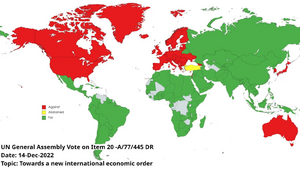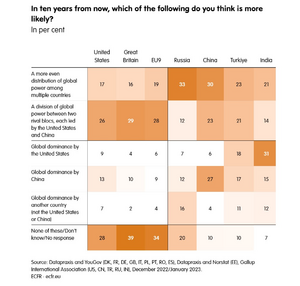More languages
More actions


Multipolarity (from Latin multus, many and polarity, poles) is a term that describes, in politics, a situation where there are more than three so-called world powers existing concurrently.
A multipolar world has existed has various times in history, but after the Second World War, the United States of America cemented its position as the sole power of the world (sometimes in concurrence with the USSR). Starting in the late 2010s however, that position has been challenged by China, which is why the concept of multipolarity has entered the discourse recently.
Polarity should not be limited solely to economical powers but generally as influence. Japan, for example, was the second global economy in terms of GDP after the fall of the Soviet Union, but as they were in the sphere of influence of the United States, they did not form a bloc against their influence and thus were not competing, but working alongside them.
The polarity of global politics can be understood dialectically, but is not solely a Marxist concept and does not necessarily refer to an imperialist world order.
History[edit | edit source]
While multipolarity has existed at various times in history and even in close geographical regions (for example, in the 17th century, European colonial powers such as France, Spain or Great Britain were competing as regional powers in the Americas), a multipolar world has not existed since the 20th century, where global trade and information make unipolar hegemony all the more impactful.
After the Second World War, the United States of America came about as the unipolar hegemon, sometimes contested by the USSR in a bipolar world.
This position the USA created for themselves was helped by being mostly untouched during the war, as well as the Marshall Plan and the creation of the petrodollar, a term describing a process by which oil producers sell their product in US Dollars (even if the buyer is not the USA), which ultimately find themselves circulated back to the US bourgeoisie.
The Soviet Union was able to compete in some ways with the hegemony of the United States, but stretched their resources thin trying to combat the bigger power everywhere, which left them open for colour revolutions in their later years, ultimately leading to a coup to overthrow the Soviet government and install a pro-West capitalist puppet in their place.
Unipolar world (1991 - 2022)[edit | edit source]
After the overthrow of the Soviet Union in 1991 and the subsequent humanitarian crisis, the USA came about as the world's hegemon -- they essentially enjoyed being above international law, dictating law and government to other countries, circulating trade back to their own economy, etc.
This situation lasted until the 2010s or so, when China, under the Belt and Road Initiative and helped by their massive economy (they were the second country with the highest GDP since 2010) took up a bigger share of the world's trade, eating into the USA's share and aligning countries towards their own policies, as they offer better deals than the imperialist bloc.
Coupled with the end of the US Empire that is happening at this moment, we are seeing the end of a unipolar world and are already in the beginnings of a multipolar world where both China and the USA form competing hegemonies.
Multipolar world (2022 - today)[edit | edit source]
Efforts towards multipolarity[edit | edit source]
The rise of multipolarity is creating blocs which primarily differ in terms of state philosophies towards governance, foreign policy, and economics. The bloc opposing the United States and its Western allies, led by China, is generally aligning to resolve the primary contradiction in global politics - imperialism, and the exploitation of the resources of developing countries. Meanwhile, the Western bloc is attempting to maintain the primary contradiction for their own interests.
Trade between blocs has grown 5-6% more slowly than trade within blocs since the beginning of the 2022 Russo-Ukrainian conflict.[1]
De-dollarization[edit | edit source]
Much of the world's trading and investment uses the US dollar as a reserve currency, which gives the United States tremendous control over financial transactions. China, Russia, India, Brazil, and the UAE are increasingly using their local currencies in bilateral transactions, as opposed to, for the time being at least, attempting to create a new single reserve currency.
See: De-dollarization.
Development[edit | edit source]
The United States has purposefully underdeveloped the Global South to ensure that their economic development does not create competition for their monopolies. What little development does occur is typically to allow exploitation of resources to be made more efficient, such as roads linking mines to ports.
In contrast, China has been financing the construction of infrastructure projects throughout Eurasia, Africa, and South America through the Belt and Road Initiative. The BRICS New Development Bank also funds projects.
Debt[edit | edit source]
The US uses financial institutions like the IMF and World Bank to keep developing countries in crippling debt, forcing them to take loans that then need to be repaid. These loan repayments require so much money from developing countries that they have trouble funding their own development projects, and need to continue to export products to attempt to pay the loans back.
Response from the imperialist hegemon[edit | edit source]
As imperialism is the highest stage of capitalism, the United States is, of course, the fiercest proponent of an America-dominated unipolar world. Losing its status as the prime imperial power would mean the end of the American way of life for its bourgeoisie. As such, they try everything they can - often with disastrous results - to restore, and maintain, their unipolarity.
Military actions[edit | edit source]
In January 2020, the United States illegally killed Iranian General Qasem Soleimani in a drone strike,[2] after which Iran retorted with a missile strike on two US airbases in Iraq.[3]
In 2021, the US Congress voted the Strategic Competition Act of 2021[4] that would give 300 million dollars a year to, notably, "develop and implement a plan for increasing the U.S. presence in the Indo-Pacific region" and "authorize various foreign military financing and diplomatic activities in Southeast Asia and the Indo-Pacific region" a clear admission of regime change operations to come.
Sanctions[edit | edit source]
In 2022, following the Russian invasion of Ukraine, the United States was the first to propose sanctions on Russia which were quickly adopted by their lapdogs in Europe[5]. As the world still relies on oil (whether Russian or not), this quickly led to price inflation and the United States is now asking for Venezuelan oil[6] despite having tried to coup Nicolás Maduro in favour of Juan Guaidó.
Moreover, due to the sanctions on the SWIFT system (essentially banning Russia from global trade), Russia traded oil in Yuan for the first time, and was shortly followed by Saudi Arabia. Essentially, countries in the same situation as Russia (powerful but on the periphery of the imperialist hegemon) have received a signal that going against NATO's wishes would get their economy crippled and their government possibly toppled, and thus they are moving closer to China (joining the CIPS system for example, an alternative to SWIFT) for their own security.
Propaganda[edit | edit source]
In 2021, it was revealed by The Herald that the United States was offering 1000 dollars per article in African newspapers that disparaged and lied about China and their investments on the continent.[7]
References[edit | edit source]
- ↑ "World Trade Report 2023 - Re-globalization for a secure, inclusive and sustainable future" (2023). World Trade Organization. Archived from the original on 2023-10-06. Retrieved 2023-10-06.
- ↑ "Qasem Soleimani: US strike on Iran general was unlawful, UN expert says" (2020-07-09). BBC.
- ↑ Erdogan Cagatay Zontur, Servet Günerigök (2020-01-08). "Iran hits Iraqi military bases housing US troops" Anadolu Agency.
- ↑ US Congress. S.1169 - Strategic Competition Act of 2021 Archived from the original.
- ↑ "List of sanctions against Russia after it invaded Ukraine" (2022-03-03). Al Jazeera.
- ↑ Anatoly Kurmanaev, Natalie Kitroeff, Kenneth P. Vogel (2022-03-05). "U.S. Officials Travel to Venezuela, a Russia Ally, as the West Isolates Putin" New York Times.
- ↑ "US plan to discredit Chinese investments unmasked" (2021-09-21). The Herald. Archived from the original on 2021-11-14.
